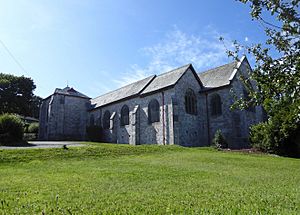All Saints Church, Millbrook facts for kids
Quick facts for kids All Saints Church |
|
|---|---|
 |
|
| Religion | |
| Affiliation | Church of England |
| Ecclesiastical or organizational status | Active |
| Location | |
| Location | Millbrook, Cornwall, England |
| Architecture | |
| Architect(s) | Hine and Odgers of Plymouth |
| Architectural type | Church |
| Completed | 1895 |
|
Listed Building – Grade II
|
|
| Official name: Church of All Saints | |
| Designated | 26 January 1987 |
| Reference no. | 1329134 |
All Saints Church is a beautiful old church located in Millbrook, Cornwall, England. It is part of the Church of England. This church was built a long time ago, between 1893 and 1895. It is considered a special historic building. It has a "Grade II listed" status, which means it is protected because of its importance. Even the war memorial on the edge of the church grounds is also a protected historic site!
Contents
The Story of All Saints Church
Why a New Church Was Needed
For a long time, people in Millbrook went to a church in a nearby village called Maker. In 1827, a smaller church, called a "chapel of ease," was built in Millbrook. This chapel was meant to make it easier for people to attend services.
Later, in 1869, Millbrook became its own separate church area. The chapel then became the main church for the village. However, by the late 1800s, Millbrook was growing. The old church was too small for everyone. It was also getting old and falling apart. So, people decided they needed a brand new church.
Raising Money for the Church
Raising money for the new church started around 1886. The vicar of Millbrook, Reverend J. E. G. Farmer, and his family made a very generous donation. They gave £1,500 to honor Mrs. Farmer's father, Captain Yule.
Over the next few years, more money was collected. Lord Clinton and Mr. W. D. Boger helped a lot. They gave land for the church. Mr. Boger also provided stone from his quarry in Plymouth. Both men were part of the building committee. This committee was led by Reverend H. W. Millet, who became the new vicar. Kenelm William Edward Edgcumbe, the 6th Earl of Mount Edgcumbe, was also on the committee.
Building the Church
The plans for the new church were created by architects Messrs Hine and Odgers from Plymouth. Mr. Philip Blowey, also from Plymouth, was chosen as the main builder. Mr. S. Collings from Millbrook worked as the clerk of the works, overseeing the construction.
The first stone of All Saints Church was laid on 21 September 1893. The Earl of Mount Edgcumbe laid the stone. He was a very important member of a group called the Freemasons. So, the ceremony was done with special Masonic traditions. Many people came to watch, including about 300 Freemasons from all over Cornwall. The building of the church had actually started about two months before this special ceremony.
All Saints Church was officially opened and blessed by the Bishop of Truro, John Gott, on 1 November 1895.
Church Design and Features
Materials and Style
All Saints Church is built from strong Plymouth limestone. Its roofs are made of slate. Special decorative stones like Polyphant, Bath, and Portland stone were used for details. The church was designed in a style called "Perpendicular." This style was popular in England a long time ago. The church was big enough to hold 560 people.
Inside the Church
The church has several main parts. It has a nave, which is the main area where people sit. There is also a chancel, where the altar is, and a vestry and organ chamber. On the sides, there are north and south aisles. There is also a south porch at the entrance. This porch was meant to be the bottom part of a tall tower. However, there wasn't enough money to finish the tower.
Many beautiful items inside the church were made by Mr. Herbert Read of Exeter. He followed the architects' designs. The octagonal oak pulpit, where the priest gives sermons, sits on a base of Beer stone. The altar, which is a special table used for services, was also made by him. The pulpit was built to remember Dr. E. Worth. Mrs. Little helped raise money for the altar. Mrs. Millet, the vicar's wife, gave the altar cross, vases, and other items. The wooden seats in the nave and aisles were made by Mr. J. P. Berry of Plymouth.
The large window at the east end of the church was given by the public. It remembers Mr. William Frederick Lapidge of the Royal Navy. Some items from the old 1827 chapel were moved to the new church. These included the bell, the font (a basin for baptisms), and the organ. The organ was even updated thanks to Miss Thomas of Anderton.
Later Additions
A brand new organ was built by Messrs Hele & Co of Plymouth. It was officially dedicated at the church on 8 September 1909. Later, on 4 April 1948, the Bishop of Truro, Joseph Hunkin, dedicated a beautiful stained glass window and a special plaque. These were put in the church to remember the men from the village who died in World War II.
 | John T. Biggers |
 | Thomas Blackshear |
 | Mark Bradford |
 | Beverly Buchanan |

